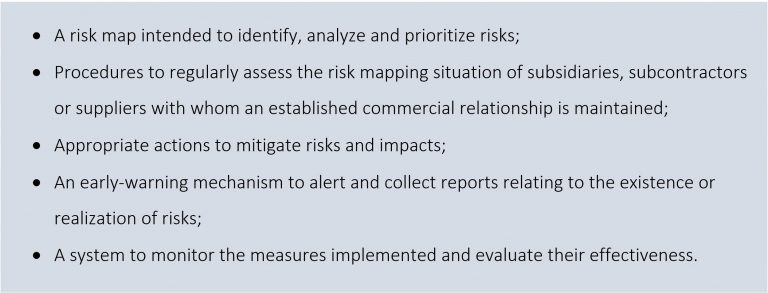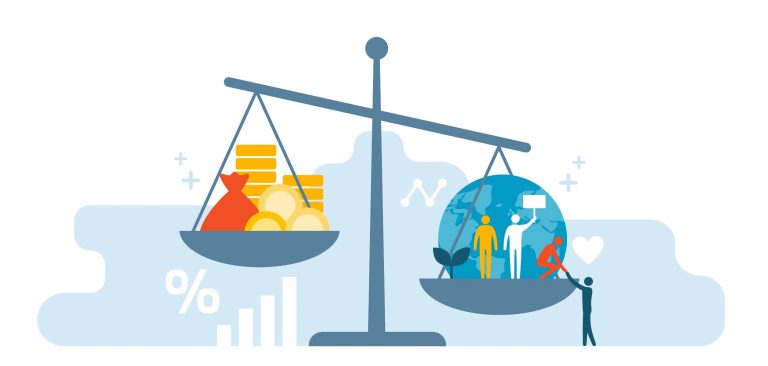ISSUE NO. 16: DOES THE FRENCH “DUTY OF VIGILANCE” LAW CONSTITUTE BEST PRACTICE FOR DOMESTIC BUSINESS AND HUMAN RIGHTS LEGISLATION?
In our combined 50 years of human rights assessment practice, one of the key learnings we have observed is that domestic-level Business and Human Rights legislation is lacking worldwide. There are numerous regional and international frameworks and guidelines for human rights impact management, such as the United Nations Guiding Principles on Business and Human Rights or the European Commission Action Plan on Financing Sustainable Growth, but none of them are legally binding.
Businesses have been taking it upon themselves to include a human rights framework in their operating standards, often through requirements for Human Rights Due Diligence (HRDD) studies, Human Rights Impact Assessments (HRIA), or reporting. The push for human rights compliance and management in the private sector has been driven by investors and industry. Investors are increasingly asking their clients to disclose human rights risks and impacts and the strategies for how these are being managed.
The ongoing generational shift is another important driver. Indeed, millennials represent a rapidly growing segment of both business leaders and consumers and their values are having proportionate influence on the way businesses are directed. As highlighted by Matthew Kilgarriff, Director of Corporate Social Responsibility at Richemont International SA, in his recent article for Corporate Citizenship, millennials have different priorities, they “want to work for companies with purpose, buy from businesses that tackle social and environmental problems, and expect greater product and corporate transparency”.
In early 2017, the French parliament adopted a law entitled “Loi n° 2017-399 du 27 mars 2017 relative au devoir de vigilance des sociétés mères et des entreprises donneuses d’ordre”, herein after “Duty of Vigilance” (unofficial English translation) for large companies with at least 5,000 employees in France or 10,000 worldwide, including subsidiaries. This legislation is unique, unprecedented and considered a landmark, as for the first time, companies are held accountable for identifying, preventing and addressing human rights and environmental risks that occur as a result of their business activities. The law assigns responsibility for the activities and operations of the main large companies, as well as their subsidiaries, suppliers, and subcontractors. It requires these large companies to establish and implement an annual “vigilance plan” with regards to the environment and human rights. They can be held accountable for these plans, which are required to be made publicly available. Among others, the vigilance plans shall include:

Should companies fail to publish or implement their annual vigilance plan, any concerned party can take action by turning to the relevant jurisdiction. The companies then have a three-month “grace” period to meet their obligations, after which they could be subject to a significant fine to be set on a case by case basis. Since its adoption in 2017, five notices have been filed under this law, the first one against a major oil and gas company, was brought up by a group of French city mayors and NGOs. In their legal claim, the concerned parties stated that the company failed to institute a vigilance plan that sufficiently identified and addressed the human and environmental impacts of its operations, including those caused by its emissions of greenhouse gases in one of the countries where it operates. Recently, the judges of the Tribunal de Grande Instance of Nanterre (High Court of Nanterre), the tribunal before which the case was brought, ruled that they did not have jurisdiction to hear the case and it should rather sit within the jurisdiction of the Tribunal de commerce (Commercial Court). The concerned parties strongly disagree with this interpretation of the law.
Although this law sets a clear and important precedent for legislation around the world, it does include shortcomings that are difficult to ignore. First and foremost, it excludes companies with less than 5,000 employees. All companies whether small or large, including those with extensive international supply chains and other risk factors, may benefit from a requirement to identify, address and report on those risks, not only because it increases public confidence but also for better performance and productivity. Additionally, there is no official monitoring on compliance with this law by the French government. Since the annual vigilance plans are required to be made publicly available, the French government relies on the public, especially interested parties (local officials, NGOs, etc.), to raise a case when a company is not complying with the law.

The French “Duty of Vigilance” law comes as a complement to the important work that companies have been undertaking on a voluntary basis and provides a framework for companies to integrate HRDD into their operations. Indeed, the lack of fully legal instruments has resulted in inconsistent approaches, inadequate attention to specific risks and a compliance arrangement without predictability or consequences. This law is at the forefront of a global movement to improve human rights and environmental management.
It remains to be seen if the French Law, along with the push from investors and the growing influence of millennials, will inspire other countries to implement similar legislation, amidst the gap in domestic human rights legislation worldwide. However, international initiatives and organizations, including the United Nations Intergovernmental Working Group on Transnational Corporations and Other Business Enterprises with Respect to Human Rights are already working to address this issue. The Group, led by Ecuador, was mandated by the UN Human Rights Council to “elaborate an international legally binding instrument to regulate, in international human rights law, the activities of transnational corporations and other business enterprises with respect to human rights”. At their last session, in January 2020, the Working Group adopted the first draft of a legally binding instrument and they endorsed the Chairperson’s recommendation to present the second revised text no later than the end of June 2020, for further consideration and discussion.
Acorn International will continue to monitor emerging legislation and regulatory frameworks for business and human rights, and we look forward to helping our clients incorporate human rights due diligence into their operations. As always, our objective is to help clients operate profitably in complex and challenging environments by proactively and systematically managing complicated community, environmental, and shareholder challenges.
Acorn International LLC delivers social and environmental risk management consulting services to the extractive industries and investors worldwide. We work with local partners in over 70+ countries worldwide. Use of these local specialists is paramount, particularly in developing countries, where information is often scarce, second-hand, and unreliable. We look forward to engaging in continuous improvement for the industry and building capacity with our partners.

